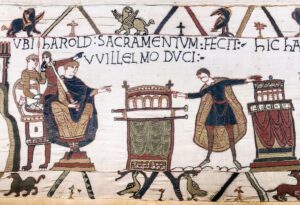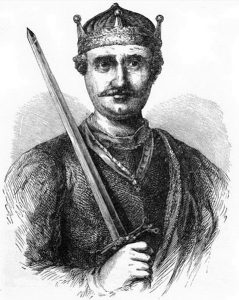
Most of us lament the fate of Harold Godwineson (or Godwinson), last of the Anglo-Saxon kings killed at the Battle of Hastings. But how many know about his younger brother Wulfnoth? Born about 20 years after his famous sibling, Wulfnoth was whisked away as hostage for his father’s good behavior when he was only about 12 years old. In all the confusion surrounding Godwine’s return from exile in 1052, he was probably kidnapped by the Archbishop Robert of Jumièges, who fled from London with the rest of Edward’s Norman allies. Robert turned over Wulfnoth and cousin Hakon to William, claiming (in one version) that King Edward had declared the Norman Duke as his heir, and sent the boys along as guarantee of his pledge. Presumably the Duke did not investigate the validity of this promise. Why should he suspect the word of an Archbishop?
Poor Wulfnoth was in quite a fix. After all, he was the youngest son and hence, expendable. At the time he was abducted, his father was striving to get his position back. Earl Godwine probably didn’t even know his son was missing until after the fact. How culpable was the King? Could Godwine accuse him of betraying his trust? (Wulfnoth was Edward’s hostage, after all.) Not likely. Would Godwine have written to Duke William offering to pay a ransom for his son? Wulfnoth was not likely ever to know, and his father died the next year, which must have seemed like a catastrophe to the lonely youth.
I’ve read some Victorian-era historians who bemoan the innocent prisoner kept under lock and key. But I suspect his confinement was more in the nature of a high-ranking son of a noble, raised in the ducal household to ensure the loyalty of the father. The captive son would be treated like a squire or even a member of the family, provisionally allowed to roam free with the understanding that he would not try to leave. Or at least, I hope this is how Wulfnoth was treated, for he never deserved his fate. I can only suspect the boy was a powerful negotiating tool for the Duke, just in case the opportunity arose. And if King Edward really did offer William the crown, of course he would keep the boy as security. There should have been no reason to put him in a prison cell.

When Harold made his fatal oath to support William’s claim to the throne in 1064, once again Wulfnoth had to stay as surety for his promise; it seems that his fellow hostage Hakon was not as important, and William let him go home. Once Harold took the throne, I wonder if William was tempted to kill his hostage? If the Duke was as nasty as he is made out to be, surely one would have expected him to take his revenge. But he didn’t. In fact, Wulfnoth was the Duke’s hostage until the day William died; on his death bed, a repentant William the Conqueror released all his hostages.
Alas, Wulfnoth’s freedom was short-lived. William Rufus is said to have rushed to England to claim his patrimony, taking Wulfnoth with him. Having a Godwineson on the loose was too risky for the Norman heir; the last thing Rufus needed was a new rebellion with a puppet figurehead. Of course by then, Wulfnoth had been a captive so many years he had no friends in England, no property, nor any family left; they had all fled the country and his sister Queen Editha had died in 1075. So he wasn’t much of a threat, and the new king was content to confine Wulfnoth to Winchester, where he may have become a monk at the cloister. He died in the year 1094.
It’s interesting to me that the least dramatic and least talked-about Son of Godwine is the only one to have survived the events of 1066. In my world of historical fiction, this gave him the opportunity to compile the remembrances of his brothers and finish the chronicle begun by his sister Editha. In her words: I preserved my real story, and intend to pass it on to my last surviving brother Wulfnoth, who can prepare it for a future chronicler not hostile to our house. Who is that chronicler? Myself, of course! You can read all about it in FATAL RIVALRY.
crispina kemp says:
I am currently reading Godwine Kingmaker, and have the other two books waiting for me. But Wulfnoth, he’s quite an enigmatic person. Is he the (once?) mentioned Prince of Sussex? Was he related to the royal line? I shall be interested to read your conclusions.
You might be interested in the work I did on 3 Saxon Wills which touch upon the Wulfnoth/Godwine family. Wulfgyth, Edwin & Ketel. Link to the first of these.
https://crimsonprose.wordpress.com/2017/10/02/wulfgyth-of-karletuna/
Mercedes Rochelle says:
Hi Crispina,
I’m sorry to say that poor Wulfnoth never had a chance to make his mark on history; he was only a child when turned over as a hostage to King Edward in 1051 and spent the rest of his life a captive. There was no relation at all to the royal line except through marriage (his sister Edith). Ditto for his big brother Harold! How Harold got to be King of England is one of history’s great ironies—or tragedy, depending on how you look at it. I hope you enjoy Godwine Kingmaker!
crispina kemp says:
Oops. Done it again. Jumped in without the full read. I took Wulfnoth to mean Wulfnoth senior, perhaps cos his is the generation relevant to where I am in your first book. Yes, of course, Wulfnoth junior. A sad tale.